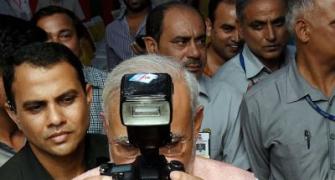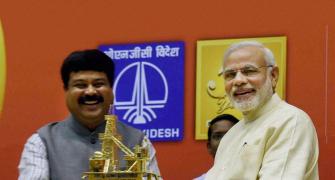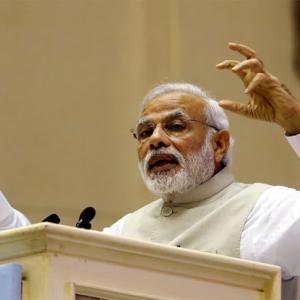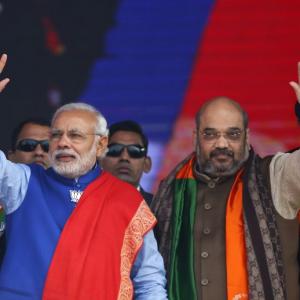Narendra Modi is squandering a mandate for change on feeble, unimaginative incrementalism.

May 16, 2014, was supposed to be a watershed. As the results rolled in, and all of north and west India turned saffron on our television screens, it was impossible not to believe that something special lay in our future. Indians had grown so used to the idea that all change would be incremental, consensual -- limited by coalition bargaining, and by the careful husbandry and expenditure of dribs and drabs of political capital. Thus, when Narendra Modi’s 282 victories shattered the coalition era, it was only fair to expect that something deep would change.
In the storm of ineffectual rationalisation that marks Modi’s first anniversary as prime minister, let us not forget May 16, 2014. Let us not forget the things he laid out as a candidate, the promises he held out and the dreams he sold. Let us not forget that the people of India gave him the rare chance -- one they did not provide to Manmohan Singh or Atal Bihari Vajpayee -- to actually live up to his promises. Modi is the most popular politician in the world’s history. He is our most powerful leader in a generation. It is not unfair to expect him to do something with this political capital, to invest it in our future. What is unfair is to expect us to treat him like any other leader we’ve had. With great power, as a wise man once said, comes great responsibility.
A common-sense evaluation of the government over the past year does not give great hope. True, it has largely stayed away from anything controversial, which is a great relief. And, absolutely, if you look hard, there are signs of hope for the future. (Most of those doing the evaluation have done precisely that, driven by the same wishful thinking that led many to imagine that a 206-seat Manmohan Singh would be a messiah for reform.)
But you have to look really hard for those signs: you have to read the uploading on a website of a draft new labour law as a great step forward, you have to imagine the finance minister’s mention of a bankruptcy code in the Budget is a step towards genuinely mobile capital -- albeit one already delayed. In terms of a legislative and administrative reform programme, these flashes of hope are all we have -- one whole year after 282 made such reform possible for the first time since Rajiv. You could, if necessary, argue this is marginally better than what we have had to put up in the coalition era -- but that was a significantly different time. The old excuses no longer apply; but never mind, apparently we are busy inventing new ones.
Here is the central problem: there is no clear direction from the top. This is not what one could have expected on May 16, 2014. Modi’s campaign was so exactly, so perfectly an extension of his will we assumed that something similar would happen to the central government once he took over. India’s ship of state is unwieldy to turn, but Modi sold his skills as a helmsman, and 282 meant he had a once-in-a-lifetime wind at his back.
Yet the constraint, one year on, is Modi himself. The government’s confusion reflects his own lack of direction. Delhi’s bureaucrats and ministers pull in different ideological and administrative directions not because Modi is not in command; it is because they do not have a clear idea of what he would do in their place. Have you heard the story -- almost certainly apocryphal -- about Margaret Thatcher throwing a Milton Friedman book at her Cabinet and making them read it? There is a basic lesson there. What India needs is a simple set of principles to be known, which would allow for effective delegation and across-the-board reform. Sadly, Modi disagrees; he imagines hands-on, case-by-case action, such as he delivered in Gujarat, is enough.
This is why this government’s successes have all been of the specific project kind: a number of clearances, auctions of natural resources, the release of grain from the state’s stores, and so on. I do not want to minimise the import and effect of these actions. But are they revolutionary? No. Even the coal auctions were essentially mandated by the Supreme Court and by a 2010 amendment of the mines and minerals Act.
Few governments would have acted otherwise under these circumstances. You did not need 282 for anything on this list. None of these involves a reworking of the system; each is a natural evolution of processes already in place. Others are driven by external actors -- by the Supreme Court, or in the case of federalism entirely by the Fourteenth Finance Commission, working under new terms of reference drafted by the previous government. In fact, we are still waiting for the first -- the first! -- legislative change entirely driven by Modi’s own vision for India’s future.
What went wrong? First: many misread Modi’s intentions. He did not intend to change how we were governed. He saw nothing wrong with the system or its motivating ideology. He only saw something wrong with the people running it.
But also, second: we misdiagnosed the slowdown under the last government. It was not a problem of “paralysis” at the top, to be solved by a “strong leader”. It is now clear that blaming paralysis was a foolish error. In fact, India was faced with a systemic problem, born of the wrong laws and insufficient regulatory capacity. We have tried to solve paralysis, and now we’re surprised the problem has barely gone away. This is because repairing growth needs investment and entrepreneurship to restart -- and that needs a completely different environment for workers and investors. It needs an environment of trust in the system, which can only happen if the laws change, along with the incentives of those enforcing them at the lower levels. Mr Modi, sadly, does not seem to have realised this yet.
Industry has figured this out. They are still waiting for a new deal, for insulation from administrative and legal risk, before investing. This has infuriated the government and its backers - this unwillingness to invest, the murmurs of discontent that business is still a difficult proposition in India, is said to be merely crony capitalists whining.
No less an individual than K V Kamath has said industry should abjectly thank government for the absence of “paralysis”. Instead of complaining about too little being different, industry should blame itself for over-investing earlier. So it should. (The real blame, of course, goes to those who financed this excessive debt -- I wonder, does Kamath, formerly of ICICI Bank, know who that might be?)
Yes, we cannot rely on debt-laden balance sheets to revive growth; but how will capital exit easily? How will new investors have faith in the system that caused those balance-sheet problems? Through legal and administrative changes, that’s how. But we have seen none of that. What we have seen is -- or so we are told -- the end of high-level corruption in New Delhi. Few will pause to note that this had already happened by the end of the previous government; the big corruption scandals all date to the end of the 2000s, remember? (Of course, even if we do have big-ticket corruption today, how would we know, without a CVC, a CIC, or a Lok Pal?)
The point of 282 was that it gave a government the power to change the rules of the game. That is all a parliamentary majority in fact does. This has not happened, yet. Till that happens, no real revival will emerge. The entrepreneurial upsurge that is the only hope for jobs in that saffron swathe of the north and west will not happen. Feeble, incremental change -- all that this government has so far provided -- will not provide us with the bottom-up revolution we need, not in 10 years, let alone five.
Without those jobs, Modi is in trouble. His incredible victory was won because people believed he would deliver a future that included jobs. He has not started building that future yet. If he does not deliver it, his party will perforce turn back to its preferred ways of winning elections - and we all know what they are. It is exactly those of us mistrustful of their social agenda who are hoping the most desperately that Modi will figure out what 282 seats gives him the power, and the responsibility, to do.
REDIFF RECOMMENDS:











